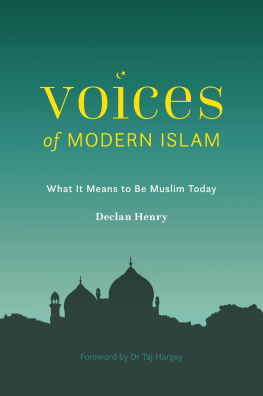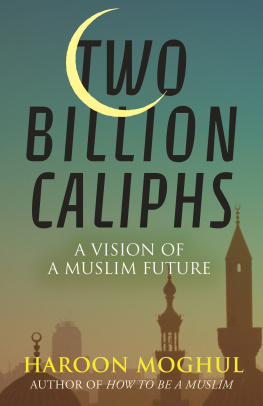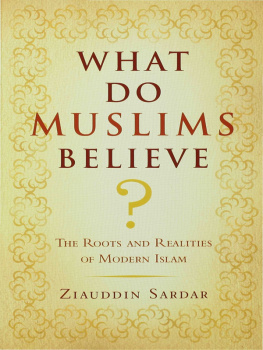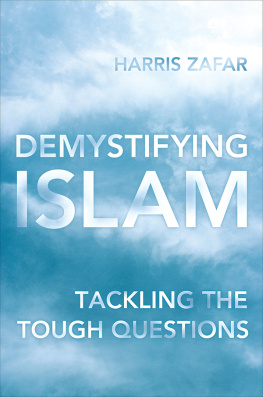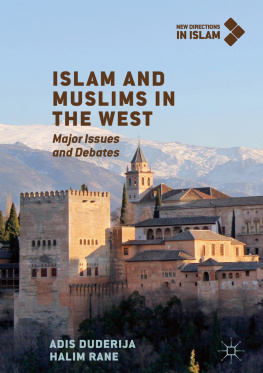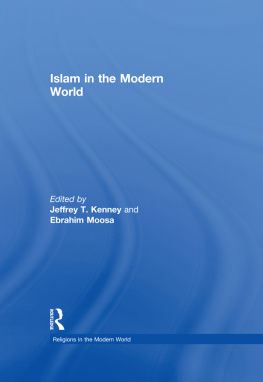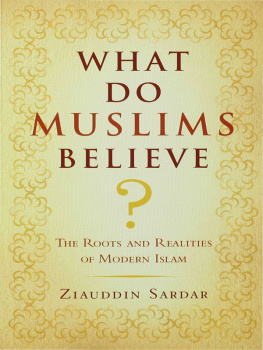ON ISLAM
ON ISLAM
Muslims and the Media
Edited by
ROSEMARY PENNINGTON
and HILARY E. KAHN

This book is a publication of
Indiana University Press
Office of Scholarly Publishing
Herman B Wells Library 350
1320 East 10th Street
Bloomington, Indiana 47405 USA
iupress.indiana.edu
2018 by Indiana University Press
All rights reserved
No part of this book may be reproduced or utilized in any form or by any means, electronic or mechanical, including photocopying and recording, or by any information storage and retrieval system, without permission in writing from the publisher.
The paper used in this publication meets the minimum requirements of the American National Standard for Information SciencesPermanence of Paper for Printed Library Materials, ANSI Z39.48-1992.
Manufactured in the
United States of America
Library of Congress
Cataloging-in-Publication Data
Names: Pennington, Rosemary, editor. | Kahn, Hilary E., editor.
Title: On Islam : Muslims and the media / Edited by Rosemary Pennington and Hilary E. Kahn.
Description: Bloomington, Indiana : Indiana University Press, [2018] | Includes bibliographical references and index.
Identifiers: LCCN 2017034239 (print) | LCCN 2017032898 (ebook) | ISBN 9780253032560 (e-book) | ISBN 9780253029348 (cloth : alk. paper) | ISBN 9780253032553 (pbk. : alk. paper)
Subjects: LCSH: Islam in mass media. | MuslimsPublic opinion. | IslamCustoms and practices.
Classification: LCC P96.I84 (print) | LCC P96. I84 O5 2018 (ebook) | DDC 070.4/49297dc23
LC record available at https://lccn.loc.gov/2017034239
1 2 3 4 5 23 22 21 20 19 18
CONTENTS
/ Hilary Kahn
/ Rosemary Pennington
/ Arsalan Iftikhar
/ Peter Gottschalk
/ Zarqa Nawaz
/ Rafia Zakaria
/ Nabil Echchaibi
/ Elizabeth Poole
/ Sobia Ali-Faisal and Krista Riley
/ Robert King
/ Ammina Kothari
/ Rosemary Pennington
ACKNOWLEDGMENTS
THIS VOLUME IS THE CULMINATION of a decade of work examining and challenging the representation of Islam and Muslims in media. Launched by Indiana Universitys Center for the Study of Global Change with support from the Social Science Research Council in 2008, the Voices and Visions of Islam and Muslims from a Global Perspective project worked to reframe the public understanding of Islam and Muslim life. This work was only made possible through support from and collaboration with our many partners, both at Indiana University and elsewhere. Among those partners are the staff of Indiana Public Media, including executive director Perry Metz, director of digital media Eoban Binder, and former producer Annie Corrigan. No longer with the outlet but still vital to the success of the project were Adam Schweigert, Christina Kuzmych, Cary Boyce, Liz Leslie, Megan Meyer, and Scott Witzke. The Center for the Study of Global Change relied on a number of Indiana University partners, including the African Studies Program, East Asian Studies Center, Inner Asian and Uralic National Resource Center, Russia and East European Institute, Institute of European Studies, Center for the Study of the Middle East, Muslim Student Association, Media School, and School of Global and International Studies.
We worked hard to create partnerships not only at the university, but also in the larger community. Our collaborations with the Islamic Center of Bloomington, Bloomington Area Arts Council, and Monroe County Public Library helped make the project, and therefore this volume, stronger. We are also indebted to the Muslim Alliance of Indiana as well as the Islamic Society of North America for their support of this project.
We are, of course, thankful for the contributions of our advisory board to the project. Their thoughtful feedback and suggestions helped ensure that our scope remained broad and that we produced a mosaic of perspectives on Islam. Our board members are Asma Asfaruddin, Cigdem Balim, Gardner Bovingdon, Shakeela Hassan, Zaineb Istrabadi, Kevin Jaques, Ed Lazzerini, Christine Ogan, Janet Rabinowitch, Faiz Rahman, and Nazif Shahrani. The late Elsa Marston, activist and author, was also an active and dedicated board member. Program officer Tom Asher at the Social Science Research Council was quite helpful during the initial years of our project.
A special thank you goes out to the hosts of our podcasts, Manaf Bashir and Steve St. George. To listen to other podcasts about Islam and Muslim life beyond those in this book, visit the Voices and Visions website, www.muslimvoices.org.
ESSAYS
PROLOGUE
THE VISION BEHIND MUSLIM VOICES
Hilary Kahn
LARGE SWATHS OF THE GENERAL public only encounter Islam and Muslims in news stories when something tragic or terrifying happens, such as the 2017 attacks in London and Istanbul and the 2016 Orlando nightclub shooting. The representation of Muslims in these stories often portrays them as radicalized, irrational, and uncontainable terrorists or depicts their suffering in a desensitized and inhumane way. While a story will occasionally be found in which Muslims are humanized or their faith contextualized, the typical narrative people find in news media is one that distances Islam and Muslims, decontextualizes the faith and its believers, misrepresents the religion as a security risk, and presents a community that is, quite simply, not us. This portrayal was shockingly exemplified in the 2015 story of Ahmed Mohamed, a Texas teenager who was disciplined by his school because he took parts of a digital clock to school. He was handcuffed and arrested by police and charged with taking a hoax bomb to school. It was suggested that Mohamed was disciplined and arrested because he was a Muslim and, therefore, suspect.
This is and always has been unacceptable, but the current onslaught of misrepresentations of Islam and Muslims is quite possibly more terrifying than the images in news media themselves. The perpetuation of such a framing is helping build impenetrable walls of indifference, dread, and fatigue, In 2015, police initially refused to define the horrific shooting of three Muslim students in Chapel Hill, North Carolina, as a hate crime, instead diminishing it to a parking dispute. The press did not question this analysis and instead represented the incident as an isolated crime by a self-proclaimed bigot rather than being part of a larger systemic hatred and fear of Muslims.
American politics, of course, also has a role to play in the building of walls of indifference and distrust. During the US presidential election in 2016, then candidate Donald Trump claimed that Ghazala Khan, the mother of war hero Captain Humayun Khan, who was killed in a car bombing while serving in Iraq in 2004, did not speak at the Democratic National Convention because, as a Muslim woman, she was prevented from speaking in public. Criticizing a Gold Star Family is unheard of in American politics, and the assumption that Mrs. Khans silence at the convention was a sign of religious gender oppression rather than motherly grief quite simply would not have occurred had the family not been Muslim. Trump was among those who questioned whether President Barack Obama was legally allowed to hold that office, suggesting he was not a native-born United States citizen. This birther debate was wrapped up in race and religion, and a number of Americans believed (and still do) that Obama is a secret Muslim. The press did little to push back at this idea until former secretary of state Colin Powell worked to discredit it during an appearance on NBCs
Next page

